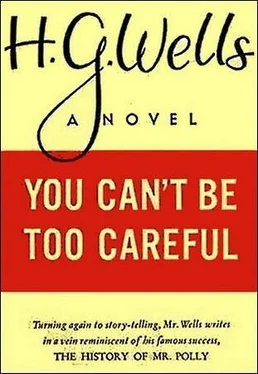H. Wells - You Can't Be Too Careful
Здесь есть возможность читать онлайн «H. Wells - You Can't Be Too Careful» весь текст электронной книги совершенно бесплатно (целиком полную версию без сокращений). В некоторых случаях можно слушать аудио, скачать через торрент в формате fb2 и присутствует краткое содержание. Жанр: Классическая проза, на английском языке. Описание произведения, (предисловие) а так же отзывы посетителей доступны на портале библиотеки ЛибКат.
- Название:You Can't Be Too Careful
- Автор:
- Жанр:
- Год:неизвестен
- ISBN:нет данных
- Рейтинг книги:4 / 5. Голосов: 1
-
Избранное:Добавить в избранное
- Отзывы:
-
Ваша оценка:
- 80
- 1
- 2
- 3
- 4
- 5
You Can't Be Too Careful: краткое содержание, описание и аннотация
Предлагаем к чтению аннотацию, описание, краткое содержание или предисловие (зависит от того, что написал сам автор книги «You Can't Be Too Careful»). Если вы не нашли необходимую информацию о книге — напишите в комментариях, мы постараемся отыскать её.
You Can't Be Too Careful — читать онлайн бесплатно полную книгу (весь текст) целиком
Ниже представлен текст книги, разбитый по страницам. Система сохранения места последней прочитанной страницы, позволяет с удобством читать онлайн бесплатно книгу «You Can't Be Too Careful», без необходимости каждый раз заново искать на чём Вы остановились. Поставьте закладку, и сможете в любой момент перейти на страницу, на которой закончили чтение.
Интервал:
Закладка:
“Who could have told, you and me would be sitting here like this three weeks ago? It’s just as if it ’ad to be....”
After that, mutuality developed at a headlong pace. They discovered that they were both dreadfully lonely, that they had reciprocal needs, and that one household halves the expense of two.
So they married and snuggled up for mutual comfort and reassurance, and because the price of everything was going up and up. She was a warm embracing woman and a great comfort to Edward Albert. His digestion improved and he ceased to brood on cemeteries and epitaphs.
This marriage widened the breach between father and son. The boy objected to calling the new Mrs Tewler “mother”, and seemed lacking in appreciation of her very generous and abundant blandishments. When she attempted to kiss him, he ducked and hurt her lip with his forehead.
When he got his discharge from the army he stayed only a few weeks at home, devouring books from the public library—he was a glutton for reading—and talking as little as possible to his father and step-mother. “You can’t say a word to him without his flying out at you,” Edward Albert complained.
“I don’t know what’s come over the boy. Nothing’s right for him.” It was to their mutual relief that Henry proclaimed his intention of going to South Wales.
Edward Albert displayed parental solicitude that was ill requited. “ ‘Ave you thought out where you’re going and what you’re going to do?” he asked. “You can’t be too careful, my boy.”
“I’m going to work there.”
“And what work?”
“You wouldn’t understand.”
Pretty thing for a son to say to his father!
Then came the dreadful news that them Agitators had got hold of him, and then the tragedy.
It made Edward Albert very unhappy. Constantly he would recur to it.
“What did I ever do that the boy should turn against me? Him and Mary, they seemed to lock their ’earts against me. Mary too.... Locked ’earts.”
“There’s a sort of bitterness in him about you. I wonder sometimes if it isn’t jealousy of that George’s Cross of yours.”
“I don’t like to think that of ’Enery,” considered Edward Albert. “I reely don’t. Even now. Couldn’t *e feel pride in his own father? No. *E*s not so bad as that. It’s these ideers he has, right-down wrong ideers. It’s a sort of disease. I remember a talk I had with him when he thought he might be sent to France to put down them syndicalists. I warned him then.
“That was before you came along, my lady. I remember it as though it was yesterday. My ’ealth wasn’t too good, the posts were all anyhow because of the general strike, and it looked as though he might not find his father when he came back. These ideers of his I told him were all wrong, but I didn’t know then where they would lead him. It’s been ’ard to see the way ’e’s gone and ’arder still to do my duty by King and Country against my own son. Maybe I let Mary spoil ’im and make too much of him. She had a sort of—well, foolishness, for him. I often said she loved him more than she did me.... Often.”
Mrs Tewler III shook her head in agreement and said no more for the time being. She was very punctilious never to say a word, not a single word, against Mary....
IV. Flying Sparks
And now that I am speaking of this widening estrangement of the Tewlers, father and son, I may perhaps go still further beyond this austere limitations I set myself at the beginning and bring the record of several other characters who have figured in this story up-to-date.
You may perhaps want to know about Evangeline Birkenhead who went off with all her belongings in a taxi-cab so precipitately out of this story in Book III, Chapter 19. She jumped out of Edward Albert’s life like a woman who finds herself in the wrong train. She became a respondent, a decree nisi, a decree absolute and that was the end of her for him.
She did have a lover in her mind when she deserted Edward Albert. She was not boasting to Mrs Butter. Her lover was the managing director of the firm of glovers for whom she worked. He was a kindly middle-aged man who had been fascinated by her animation. His first wife had not made him very happy. She was a cold, religious woman, and a short-lived escapade on his part in another direction enabled her to half-divorce him. Only half, because after the decree nisi she was converted to Roman Catholicism and refused to have the decree made absolute, leaving him debarred from any other marriage. So in a state of considerable repression he conceived a very real passion for the bright young Evangeline. He imagined such intelligence into her that almost he evoked it.
He felt too mature and responsible towards her to seduce her, but he showered a devotion upon her that at once delighted and tantalised her. Once or twice they kissed, but he disciplined himself to a sentimental restraint which blinded him to the fact that in a year or so she had grown up very completely. He promoted her to a responsible position in the firm and contrived her trip to Paris to please her. He suffered acutely from her marriage, and, when she sought him out again, he succumbed very readily to her proposals, reinstated her in the business and lived with her as his wife, in a world which is less and less disposed to demand a sight of your marriage lines.
She became extremejy philoprogenitive. She was interested in children; she wanted them. I suppose it was part of her acute sense of children that made her repudiate our unfortunate Henry. She wasn’t going to have a thing made after the fashion of Edward Albert thrust upon her. She resisted every momentary impulse to regard Henry as more than a premature and misbegotten little cuckoo. On the other hand, she elevated Mr Grigson to the highest honours among possible sires. She almost believed the glowing imaginations she wrapped about him. Millie Chaser had to listen at times to revelations about that quiet-seeming, civil-spoken gentleman that threw a languid pallor over the dalliance of Psyche with Cupid. At any rate, the children were healthy, active and good-looking, and Evangeline made, as people say, a remarkably good mother. She had a quick eye for temperatures, symptoms and slackening appetites. Her fourth offspring, the second son, was born a few weeks ago.
She reads the newspapers and she may even go tearing her way through a book that arouses her curiosity. Through her unquestionably magnifying eyes she sees the ever-increasing disaster of the world in terrifying proportions. She is persistent in her struggle to realise some more satisfactory way of securing a good life for her offspring than that confusion promises, she talks to her husband, she worries all the brains she has, and it may be she will wrench something worth while out of it all. She may get the idea of Eutrophy, and that is a good idea. She may grasp the fact that the fate of every child and the fate of the world are inseparable, so that no child on earth now has much of an outlook unless there is a world revolution. Harsh, clamorous and vain though she is at times, the world revolution may yet get a profit out of her energy. She is less of a resultant and more of a will than anyone else in this story.
So much for Evangeline. Mrs Humbelay, I regret to say, for I have an irrational affection for her, died very suddenly of fatty degeneration of the heart, during a London air raid in 1940. She was saying,” It doesn’t stand to reason,” and then she and her voice faded out altogether amidst the uproar. But then her voice always faded out. They did not realise she was dead until they perceived that her lips moved no longer.
Mrs Thump, another valiant woman, kept the standard of English dressmaking flying among the refugees of Torquay. Torquay became a city of refuge for a multitude of people who were elderly or disposed to consider themselves elderly or otherwise excused from any sort of helpful service for the duration of the struggle. But they felt it their duty to maintain a brave face towards Hitler and remain almost defiantly comfortable. And to grumble incessantly at the conduct of affairs. The more the rationing of clothes restrained them from new costumes, the more they appreciated the ability of Mrs Thump -in making over and modernising the ample wardrobes they already possessed.
Читать дальшеИнтервал:
Закладка:
Похожие книги на «You Can't Be Too Careful»
Представляем Вашему вниманию похожие книги на «You Can't Be Too Careful» списком для выбора. Мы отобрали схожую по названию и смыслу литературу в надежде предоставить читателям больше вариантов отыскать новые, интересные, ещё непрочитанные произведения.
Обсуждение, отзывы о книге «You Can't Be Too Careful» и просто собственные мнения читателей. Оставьте ваши комментарии, напишите, что Вы думаете о произведении, его смысле или главных героях. Укажите что конкретно понравилось, а что нет, и почему Вы так считаете.












